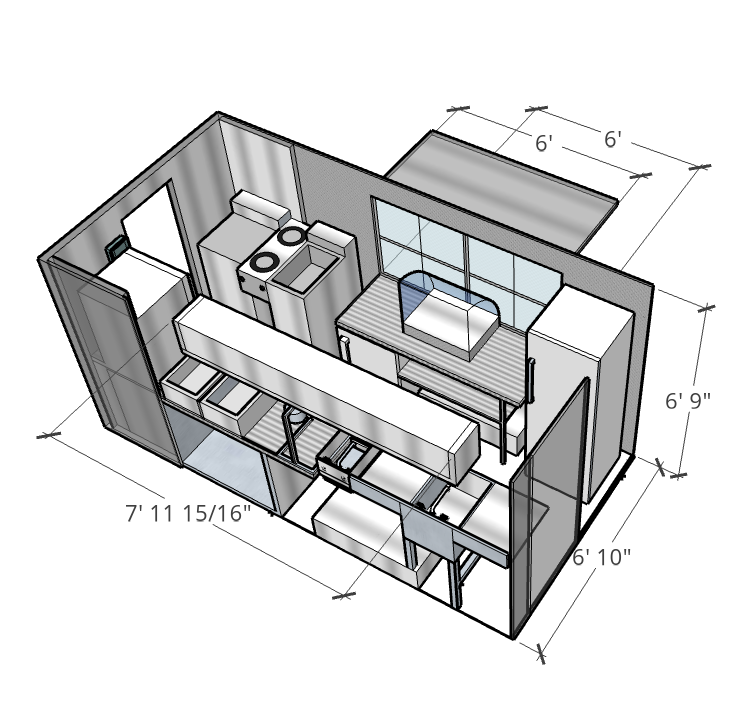Epicurean on Wheels: Unveiling the Culinary Truck Lifestyle
Envision cruising through vibrant roads, a scent from grilling dishes wafting through surroundings. This cuisine on wheels lifestyle embodies liberty, innovation, and the tasty pleasures in culinary arts on the move. To countless food enthusiasts, starting a food truck business is a perfect fusion of passion and entrepreneurship, letting them to bring their flavors directly to eager customers within their neighborhoods.
Building a food truck is not just focused on rolling out scrumptious food; it’s about crafting an atmosphere that connects with clients. Whether it’s the design of the vehicle and the menu you provide, every detail is an occasion to showcase your food artistry. Enthusiasts can try with different dishes, attending to local tastes while establishing a distinct identity that catches attention in a busy market. If you're ready to begin on this tasty adventure, everything begins by understanding the ins and outs of food truck building and the process needed to transform your culinary dreams into a thriving business.
Creating an Ideal Food Truck
Starting a thriving food truck starts with crafting a vehicle that stands out and meets your culinary requirements. Begin by evaluating the layout of your kitchen within the truck. The configuration should facilitate efficient movement and workflow, ensuring that you and your team can prepare and serve food quickly, even during peak hours. Include essential tools such as grills, fryers, and refrigeration units, ensuring they fit comfortably inside the space while complying with health and safety regulations.
The visual appeal are key in drawing in customers, so consider your exterior design. The food truck's color scheme, signage, and branding should represent your food offerings and personality. Using vibrant colors and eye-catching graphics can draw in hungry patrons from afar. Keep in mind that the overall look of your truck should communicate the quality and type of cuisine you serve, making a strong first impression that invites people to check out your menu.
Finally, don't overlook the importance of practical considerations when designing your food truck. Make sure the construction materials are durable and easy to maintain, as your truck will be subjected to varying weather conditions and frequent use. Think about including features like sufficient storage for supplies and equipment, a flexible serving window, and accessibility for customers. A well-designed food truck improves the customer experience but also supports your operational efficiency, helping your business succeed on the road.

Essential Equipment for Mobile Kitchens
When starting a mobile truck operation, equipping your truck with the necessary equipment is vital for effective performance. The heart of your cooking space should feature essential culinary appliances including griddles, fryers, and cooktops. A industrial refrigerator is further important to keep food fresh, while a deep freeze helps to keep time-sensitive items. Spending in quality equipment ensures that you can serve top-notch food efficiently and smoothly, responding to the requests of eager customers on the go.
Besides cooking appliances, food trucks need specific safety and sanitation equipment. A triple sink for cleaning dishes and cutlery is a essential necessity, along with dedicated handwashing stations. Having a fire suppression setup operational is critical for security compliance, and an adequate hood exhaust is necessary to handle smoke and heat. Proper cleaning equipment not only fulfills hygiene regulations but also fosters a reputable appearance for your business.
Finally, don't overlook the significance of storage and serving equipment. Racks, prep tables, and food heaters are essential for organizing your workspace and guaranteeing a efficient process during peak hours. Containers, like containers and utensils, play a significant role in customer satisfaction and takeout efficiency. Smart organization solutions enable you to maximize your small space, guaranteeing that everything you need is within reach while maintaining a tidy and organized environment.
Managing Regulatory Requirements and Permits
Initiating a food truck business requires a comprehensive understanding of the different regulations and licenses that regulate food service operations. Every city and state has its own bundle of legislation, which can dictate everything from the locations you can park your truck to the kinds of food you are permitted to serve. Studying these regulations is essential to ensure compliance and avoid sanctions. It's wise to connect with local health departments that regulate food safety standards, as well as zoning boards that manage the assignment of vending locations.
Once you have a solid understanding of the essential regulations, the following step is to obtain the relevant licenses. This procedure can be tedious and may involve numerous applications, inspections, and fees. Common permits you will need include a food service permit, business license, and potentially a special vending permit depending on your site. Be set to submit detailed information about your food truck, including your menu, food storage, and preparation processes, to confirm regulatory bodies of your compliance with health and safety standards.
Finally, it can be helpful to participate in local food truck associations or networks. These organizations can offer useful resources and support in managing the regulatory landscape. Networking with other food truck owners may provide tips into effective strategies for obtaining permits and running legally. Establishing relationships within your community can also open opportunities for collaboration and prospective partnerships, boosting your food truck’s visibility and prosperity.